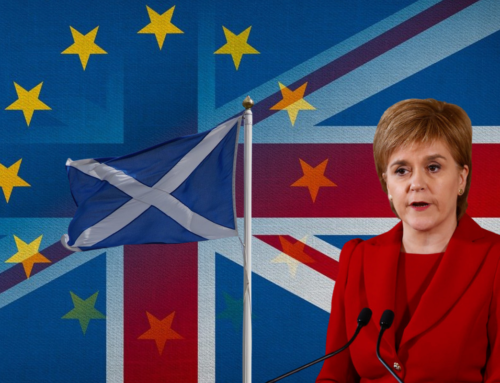
by Brendan Donnelly
Director, The Federal Trust
18th October 2019
This article was first published on Eurobabble.
| Editor’s note: As foreshadowed in this article, the House of Commons decided on 19th October to defer more detailed discussion of the Withdrawal Act until the following week. The votes of the DUP were crucial in securing this deferral. |
Discussing the protracted negotiations to end the Vietnam war, the American diplomat John Negroponte once said that it had taken a long time to “force the North Vietnamese to accept the American surrender.” Things have moved more quickly in the Brexit negotiations, where it has taken barely a fortnight for Boris Johnson to surrender his supposed central objection to the Withdrawal Agreement negotiated by Theresa May, that of a customs and regulatory border in the Irish Sea.
Indeed, he has gone further. The supposedly temporary Irish backstop has, in the Johnsonian negotiations, been transformed into an almost certainly permanent arrangement that will emphasise the economic and constitutional singularity of Northern Ireland. It is unsurprising that the DUP have refused to support the renegotiated Withdrawal Agreement.
It should not have been a surprise that Johnson was willing so comprehensively and rapidly to abandon his erstwhile allies in the DUP. It has always been obvious that his personal interests and those of his political power base, the Conservative Party, have dictated all his attitudes and behaviour with regard to Brexit. The unseemly haste of his volte-face in the past fortnight seems to have been prompted in particular by his fear that if he had no Withdrawal Agreement to present the Commons on 19th October, he would be forced by the Benn Act to submit a request to the European Council for an extension of the Article 50 negotiating period. This would have been a personal humiliation for him and a generous pre-Christmas present to the electoral prospects of the Brexit Party.
Whether he will be able to persuade the Commons to accept his Surrender Withdrawal Act tomorrow is entirely unclear. Without the support of the DUP he may well struggle to do so, not least because the Political Declaration which accompanies the Withdrawal Act moves further away from the protection of environmental and social standards which Jeremy Corbyn and the rest of the Labour Party have seen as central to any acceptable Brexit agreement. If the DUP do not support the new Withdrawal Agreement, Johnson will require an implausibly large number of Labour defectors to help the Agreement to a Parliamentary majority.
But if there seem good prospects of defeating Boris Johnson’s Withdrawal Agreement tomorrow, no certainty yet exists about alternative courses of action. It seems likely that MPs will confine themselves tomorrow to accepting or rejecting (perhaps provisionally) the Withdrawal Agreement and to postponing until next week further consideration of such measures as a Vote of No Confidence in the government or a people’s vote/confirmatory referendum. There are many supporters in the House of Commons for such or similar measures, but a stable and coherent majority for any one of them has yet to emerge.
It is clear that the number of MPs favouring a further EU referendum has increased in recent weeks. The emergence of the new Withdrawal Agreement has brought together two strands of thinking among MPs, namely those anyway in favour of a further referendum before Brexit took place and those who think that the particular text submitted by Boris Johnson is so problematic that it needs further popular endorsement before it can be ratified by Parliament. Differing views persist, however, as to the timetable and procedure for a new popular vote. Probably the majority of those favouring a further referendum believe it should take place before any general election, perhaps on an accelerated timetable. Others, notably the Scottish National Party and (until now) Jeremy Corbyn favour a general election to be succeeded by a referendum afterwards.
Overarching all this division about tactics remains the unresolved strategic question of what sort of government, with what Prime Minister and with what mission, should replace the present Conservative administration of Boris Johnson. Unless Johnson’s government is replaced before 31st October, he will ruthlessly and perhaps successfully use all the powers of his office to ensure that the UK will leave the EU on that date, either with “no deal” or with Johnson’s “deal.” The Benn Act may act as a constraint upon his ability to do so, but it would be a brave commentator who would bet that Johnson will not find some way of circumventing the Act. It is in any case uncertain whether the European Council would be willing to extend to a Johnson government the extension of the Article 50 negotiating period upon which the Benn Act is premised.
There is and always has been a majority of MPs aware of the economic, political and constitutional damage any form of Brexit will inflict on the country. It will represent a staggering failure of the British political system if they are unable over the next crucial fortnight to coalesce in such a way as to prevent this tragic outcome. This failure will be all the more spectacular given that an obvious remedy lies easily at hand, that of a Government of National Unity set up to ask for an extension under Article 50 and to hold as rapidly as possible a referendum to choose between the new Withdrawal Agreement and remaining in the EU. A wide range of acceptable candidates exist to lead such a government. It is a symptom of dysfunctionality in British politics that so much attention has focussed until now on an unacceptable one in Jeremy Corbyn.
It has long been clear that the question of Brexit would hinge in the final analysis on the capacity of the House of Commons to generate an alternative government to this present minority Conservative administration. If this alternative government does come into being, and a rapid referendum reverses the Brexit avalanche, then those such as New Europeans, who have long been pressing for a “confirmatory vote,” will have good reason to congratulate themselves upon an avoidable disaster averted at the last moment.
If Parliamentary bickering and tactical manoeuvring allows Boris Johnson and his allies to take the UK out of the EU for want of effective opposition, the judgement of the electorate now favourable in its majority to Remain will be severe and speedy in making itself felt. A referendum in the coming months would pose immense challenges to the continuation of the present Party landscape in the United Kingdom. But it would be a mistake to think that ducking this challenge now will allow normal party-political service to be resumed in any foreseeable future. Brexit has tossed a hand grenade into the pond of British politics. The ripples and dead fish will continue to surface for many years to come.






